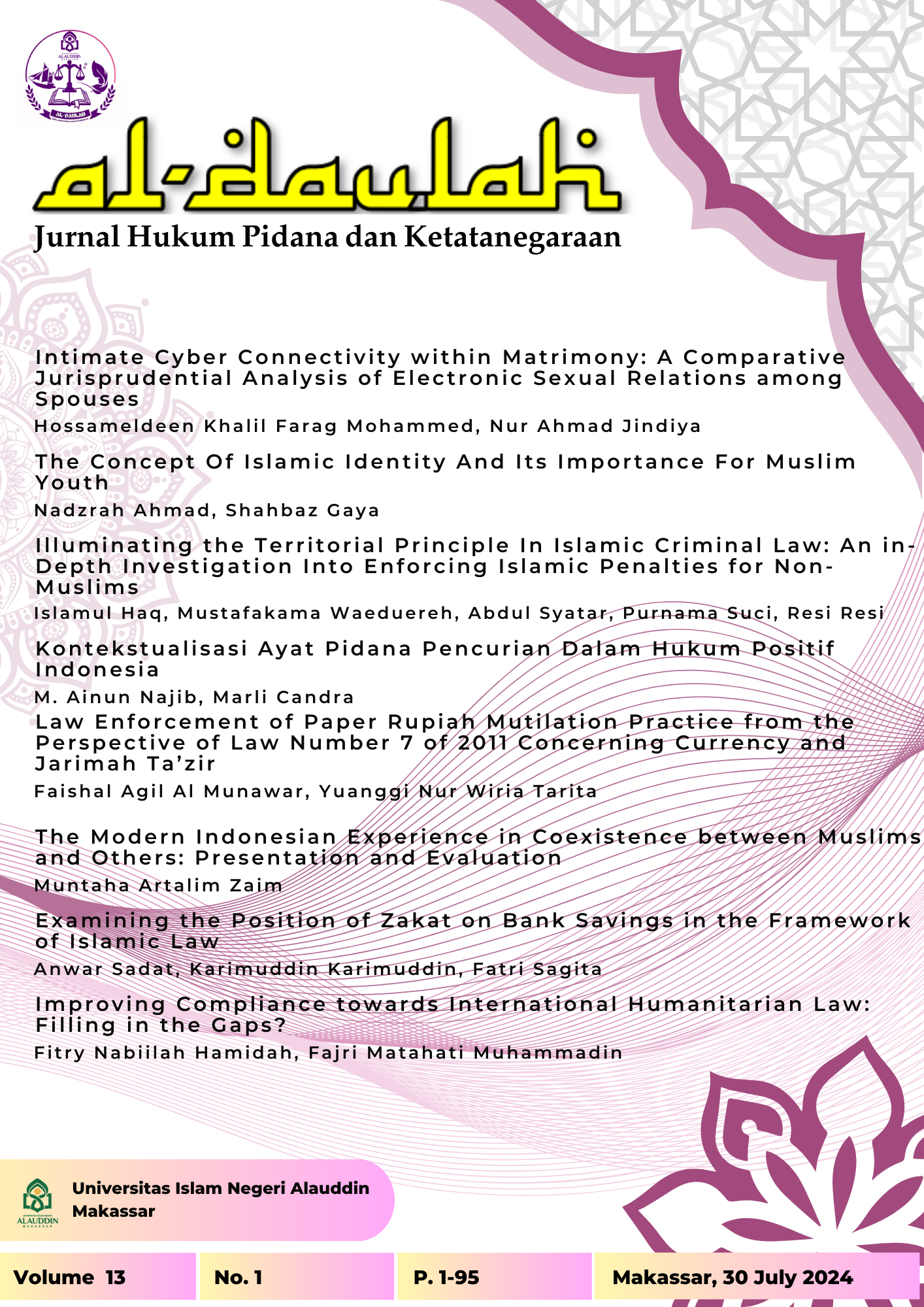CONCEPTION OF LEGAL PROTECTION IN ISLAMIC LAW
Abstract
Legal protection is a human right which is a basic need for every human being, both human beings as legal subjects and human beings as legal objects. As legal subjects, humans have civil rights that must be implemented in accordance with applicable legal provisions. Likewise with humans as legal objects, their rights must still be protected even though they have been convicted by law. Sometimes legal protection for humans cannot be realized because the source of the applicable law does not provide legal instruments and even the protection of the law does not materialize because of the lack of understanding of the source of the law which applies in society.
Islamic law as one source of law and adopted in countries like Indonesia offers the conception of legal protection in accordance with the dignity and human rights, because of the flexibility of Islamic law, so that Islamic law can be understood and adjusted to the social development of the society. Islamic law that emphasizes public benefit guarantees the legal protection needed by the community, but the values of flexibility must still be explored from the main sources of the Qur'an and the hadith of the prophet.References
al-Asymawi, Muhammad Said. “Usul asy-Syariah. terj. Luthfi Thomafi. Nalar Kritis Syariah. Edisi Khusus. Cet. I; Yogyakarta: 2012.
ad-Dharāini, Fathi. al- Manāhij al-Usuliyah fi Ijtihād bi al-Ra’yi fi al-Tasyrī. Damaskus: Dār al-Kitāb al-Hadīts, 1975.
al-Fathlāwi, Suhāil Husāin. Huqūq al-Insān fi al-Islām. Beirūt: Dār al-Fikr al-Arabī, 2001.
Ali, Muhammad Daud. Hukum Islam, Pengantar Ilmu Hukum dan Tata Hukum Islam di Indoensia. Edisi Kelima. Cet. 5; Jakarta: Raja Grafindo Persada, 1996.
al-Yūbi, Muhammad Sa’ad bin Ahmād bin Mas’ūd. Maqāshid al-Syarīah al-Islāmiyyah wa Alāqatuha fi al-Adillāh al-Syar’iyyah. Cet. I; Riyādh: Dār al-Hijrah, 1418 H/1998.
Bahjat, Ahmad. Anbiyā Allah. terj. Muhammad Alkāf, Sejarah Nabi-Nabi Allah. Cet. 2; Jakarta: Lentera, 2006.
Barakatullah, Abdul Halim dan Teguh Prasetyo, Hukum Islam Menjawab Tantangan Zaman yang Terus Berkembang. Cet. I; Yogyakarta: Pustaka Pelajar, 2002.
Glasse, Cyril. Ensiklopedia Islam. Kata Pengantra Prof. Huston Smith.Ter. Ghufron A Mas’adi. Ed. I cet. 2 jakarta: PT. Raja rafindo Persada, 1999.
Hakim, Rahmat. Hukum Pidana Islam. Cet. Ke-2; Bandung: Pustaka Setia, 2010.
Halim, Abdul. Politik Hukum Islam di Indonesia. Cet. 1; Jakarta: Ciputat Press, 2005.
Ismatullah, Dedi. Sejarah Sosial hukum Islam. Cet. I; Bandung: Pustaka Setia, 2011.
J.N.D. Anderson, Islam Law in the Modern World (New York:New York University Press, 1959.
M. Zein, Satria Effendi. Hukum Islam, Perkembangan dan Pelaksanaannya di Indonesia dalam Ari Anshori (Penyunting) Fikih Indoensia dalam Tantangan (Surakarta: FIAT-UMS, 1991), h. 23.
Manan, Abdul. Reformasi Hukum di Indoensia. Cet 1; Jakarta: Raja Grafindo Persada, 2006.
Mas’ūd, Muhammad Khalid. Islamic Legal Philosophy (Islamābad Islamic Research Institut, 1977.
Qardhāwi, Yusuf. Madhal li Dirāsah al-Syariah al-Islamimiyah diterjemahkan oleh Ade Nurdin dan Riswan dalam Judul membumikan Syari’at Islam ; keluwesan aturan Ilahi untuk manusia. Cet. 1; Bandung; Mizan, 2003.
-------, Studi Kritis as-Sunnah, terj. Bahrun Abu Bakar. Bandung: Trigenda Karya, 1995.
Rochman, M. Ibnu. Hukum Islam dalam Perspektif Filsafat. Cet. 1; Yogyakarta: Philosophy Press, 2011.
Shihab, M. Quraish. Tafsir Al-Qur’an Al-Karim, Tafsir Atas Surat-Surat Pendek Berdasarkan Turunny Wahyu. Cet. 2; Bandung: Pustaka Hidayah, 1997.
Syarifuddin, Amir. Ushul Fiqhi. Jilid 2. Cet. I; Jakarta, Logos Wacana Ilmu, 1999.
Ulwāni, Abdullah Nashih. Syariat Islam Hukum yang Abadi, terj. Daud Rasyid. Jakarta: Usamah Press, 1994.
The authors of a work hold the copyright and grant the Al-Daulah: Jurnal Hukum Pidana dan Ketatanegaraan the right of first publication. The work is also licensed under the Creative Commons Attribution License (CC BY 4.0), which enables others to share the work while acknowledging the authorship and initial publication in the journal. The authors can make separate contractual agreements for the non-exclusive distribution of the published version of the work, such as by posting it to an institutional repository or editing it for a book, with an acknowledgment of its initial publication in this journal. Authors are allowed and encouraged to post their work online, such as in institutional repositories or on their website, before and during the submission process. This can lead to productive exchanges and greater citation of the published work.


